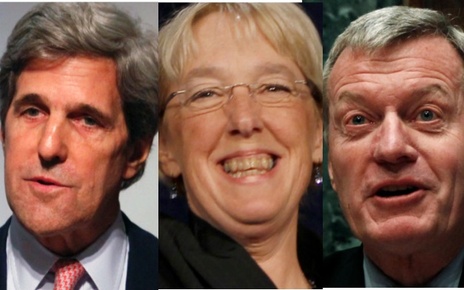No Super Democrats On This Committee

How can we explain the Democrats who have been appointed to serve on the Joint Select Committee? (Commonly known as the 'Super Committee.')
Let's play political "Jeopardy."
Under Senate Democratic appointees to the Joint Select Committee on Deficit Reduction, for $200, "Her job is to elect Democrats to office and provide her candidates with political fodder to use against Republicans."
"Who is Patty Murray?"
Under Senate Democratic appointees to the JSC, for $400, "He is a classic northeastern liberal who ran for president and is opposed to Medicare changes."
"Who is John Kerry?"
And, under Senate Democratic appointees, for $800, "He has publicly opposed fundamental Medicare reform, and chairs the relevant committee."
"Who is Max Baucus?"
Well done.
Senate Majority Leader Harry Reid announced those Democrats as his appointees to the JSC.
Some had thought that the Senate GOP and Democratic nominees to the JSC would be Senators inclined to compromise on major issues like Medicare, pensions, and closing tax loopholes. After all, the reasoning goes, Sen. Reid and Senate Minority Leader Mitch McConnell know that the nation's fiscal future is a shambles and will try to offset what are expected to be House nominees who hold rigid views on taxes and entitlements.
Conventional wisdom has it that the JSC will be lucky even to produce a minimal debt reduction document. If the first choices for the JSC are any hint, this time conventional wisdom is right.
Meanwhile, President Obama delivers a limp speech that sends the stock market down another 200 points on the Dow within an hour.
Some thought that pain, in the form of market spasms, would jolt the Congress and the White House to face reality. Well, markets spasmed and that prompted nasty exchanges of press releases from all parties. Congress is still out on recess and the Congressional Budget Office soon will make its annual economic update and long-term financial projections. Perhaps those numbers will galvanize real action, when analysts realize that poor economic performance has increased projected indebtedness.
Before readers castigate this dour outlook, let's end on an upbeat note.
As a caustic analyst said recently: "Well, the economy is so poor, and the Europe so chaotic, and the world in such turmoil, that interest rates have stayed way down. Now if only folks could get a loan."
As we said earlier, let's play "Jeopardy." Washington sure is.

